The school hall was packed with excited students. Ramsharan, my opponent, was announcing his promises to the students: “I will ensure more playtime, improve the quality of the rice in the canteen, enlarge the dining hall, get new furniture in the classrooms, plant flowers on the path between the hostel and the school, ensure tapped water is brought to the school, get a stationery shop opened near the school.”
It was election time in 1940 in our school in Lyallpur, in undivided Punjab in British India (now in Pakistan). The entire school would be voting for a prefect for the next year. The prefect was responsible for improvements in the school infrastructure, acting as a bridge between the teachers and the students.
I had decided to contest, but by the time it was my turn to speak to the students, I was tongue tied. Ramsharan had stolen all my thunder. He had already expounded all my promises. So I just assured the class, that if elected, I promise to be an efficient and honest prefect. My friends wrote me off as a candidate.
It was a horrendous situation. In the evening, I sought time with Mr Sapru, our sagely principal whose counsel I trusted. “What do I do, Sir? Ramsharan has hijacked all the assurances I wanted to give to the students.”
“Look Hari,” explained my principal, “remember that less is more. Pick up a few points and work on them, rather than make a laundry list of deliverables.”
He added: “And always keep time on your side. Promise that you will get the garden replanted within eight months and do it in seven months. Then you will be respected. However, if you promise to do it in five months, and take six months instead, you will be considered a failure. Always promise little, deliver more.”
That night I could not sleep. I reflected on the advice given by my principal, and I realised that his words were pearls of wisdom. By next morning, my election strategy was clear in my mind.
I met my close buddies, Harbans, Pratap Singh and Nityan, and told them we were going to reduce our 10 promises to just three. We would focus on enlarging the dining hall, covering the walking path with grass and having a doctor visit the school once a week. Moreover, we would seek nine months time to deliver these promises.
Pratap Singh was furious: “You will never win the election. How can we take nine months for these tasks? Nobody will vote for you.” I explained: “Each task will require drawing plans, obtaining the school’s permission, selecting contractors and gathering funds, and the contractors will need three to five months to complete the work.” They saw my point, but were glum.
So at the next election meeting I announced that I would focus on just three points and would need nine months to deliver them. There was stunned silence. Ramsharan and his team were ecstatic. They wrote me off.
The atmosphere was electric on election day. Within three hours the entire school had voted through a secret ballot. I expected to lose. However, I was staggered to find that I had scraped through by one vote. We got down to executing our three promises and concluded each activity a month before schedule. The class was thrilled.
Fast-forward to today. Indian prime minister Narendra Modi has completed a year in office and there is already fervent debate about his performance. Managing India with its multifarious issues like religious diversity, economic disparity and regionalism, is onerous. The job requires a stout heart and tremendous sagacity.
Moreover, Mr Modi has promised generously: a corruption- free government, rapid economic growth, toilets for all Indians, improvements in urban infrastructure, 100 new cities, foreign direct investment, bank accounts for all villagers, and so on. He has travelled extensively –including, this week, to the UAE, trying to refurbish India’s image.
Perhaps Mr Modi should focus on basic deliverables that matter to the common man, such as ending endemic corruption, jobs for the young, toilets for all and building just five new cities per year. It would help him to split his ambitious agenda into yearly instalments over the next four years and deliver annually.
Seeing the mountain of problems confronting Mr Modi, I recollect the straightforward advice that my school principal gave me 75 years ago: promise little, deliver more.
Hari Chand Aneja is a former corporate executive who now keeps busy with charity work

